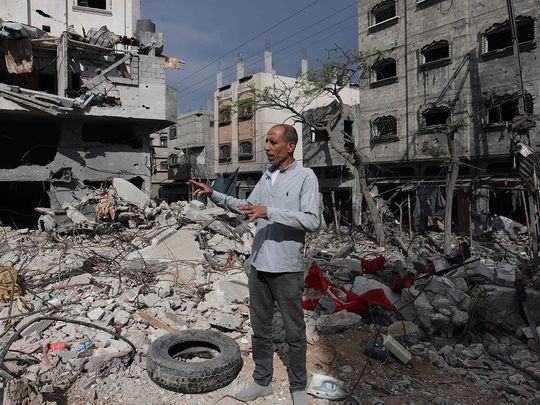
Sometimes you know. Perhaps it’s that thing wired into a father’s brain. But I knew, as a father, that it was my daughter who was calling the moment the phone rang on Sunday.
Since last Sunday was coincidentally both Eid al-Adha and Fathers Day, you would think that there was nothing unusual about your daughter, in New York, calling you, in Washington, to wish you a blessed Eid and a happy Fathers Day.
Alas, there was something unusual about it — unusual for a Palestinian father to be celebrating both the rituals of a holy Muslim festival and the joys of fatherhood on a day when, in another coincidence, the UN announced that Gaza’s population of 2.3 million men, women and children — half of them fleeing Rafah in search of a sheltering refuge in a strip of land where there is no place left for refugees to shelter — is grappling with starvation that the international body described as “unspeakable”.
And it was all taking place that day against the backdrop of overnight attacks by Israeli forces in southern, central and northern locations in this little, tormented, 142-square-mile smidgen of land.
Whistled clean of dignity
After you hang up the phone, an ache begins to gnaw at you, within you, like a raw wound. You’re a diaspora Palestinian who has lived a comfortable life in the West since your late teens. You know your kids love you.
You know that after they left the nest and went on to live their own lives, carving out their own careers and raising their own families, you, their father, who had kept them nurtured, safe, alive when they were growing up, will remain to them someone they will continue to look up to no matter how tall they get.
Oh, how proud you feel, how enchanted you become as a father when you hear them say, before they hang up, “Love you, Dad”.
The ache that gripped my being like a raw wound on Sunday gripped me after I began to muse over how a Gazan father, unable as he is these days to keep his kids nurtured, safe, alive, feels when his kids tell him they are hungry and scared; when he sees they are sick, coughing like old men; when he watches them shrinking, before his eyes, into skin and bones, all the while knowing that there was nothing he could do about it.
Oh, the guilt a Gazan father must feel at the realisation that by fathering his children he had effectively passed sentence on them and that he has now come to embody the image of an ineffectual father figure who is whistled clean of the dignity that fatherhood bestows upon him.
Gazans’ chocked silence
Look, you may be a Palestinian father living your diasporic life comfortably but the unendurable suffering visited on Palestinians in the homeground, whether in Gaza or the West Bank (the two little remnants of historic Palestine left to its indigenous people after the Nakba) is an indivisible part of your identity as a Palestinian. The trauma of it still leaves you emotionally maimed, wherever you live your secure life in the Palestinian diaspora.
You too as a father feel guilt like your Gazan counterpart does, albeit guilt of a different kind. Guilt that, by a trick of fate, by an accident of good fortune, you are not “there” but “here”, safe and comfortable, resenting yourself for having missed the rendezvous with hell that Gazan fathers had met eight months ago.
Guilt at using fancy words in your writing to describe the anguish of a Gazan father burying his child in a makeshift grave amid the rubble in Rafah, after that child was incinerated in the fire triggered by an air strike earlier that week. What the devil do you know about how that anguish feels?
Those were the existentially confounding thoughts you had on Sunday, thoughts you had as a father musing over fathering and fatherhood — thoughts whose grimness, however, was tempered by the knowledge that the support for Palestine evinced by peoples everywhere around the globe had become the loud cry of Gazans’ chocked silence.
So before you conclude your conversation with your daughter, who feels your gloom reaching her, as it were, through the ether, she shares with you what you consider may be a profound observation on the Palestinian people’s syntax of liberation. “Don’t fret, Dad, our future is well-known”, she said. “It’s only the present that is uncertain”.
Palestinian children have become, at this parlous juncture in the arc of Palestinian history, mentors to their fathers.
— Fawaz Turki is a noted academic, journalist and author based in Washington DC. He is the author of The Disinherited: Journal of a Palestinian Exile









